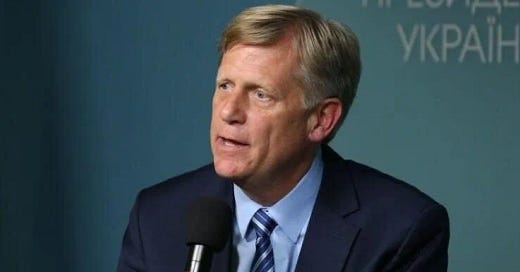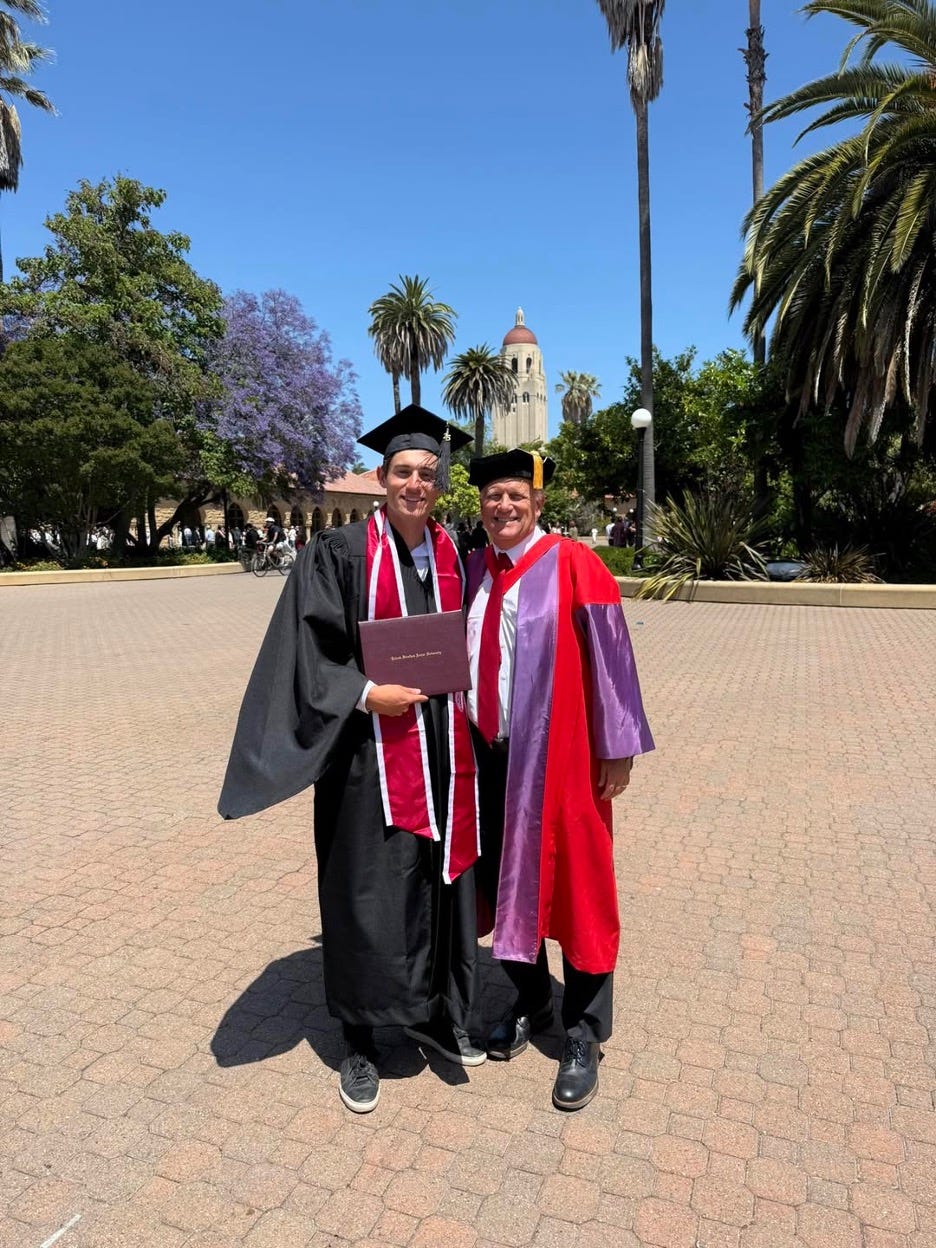Dear friends and colleagues,
The end of the spring quarter is always a hectic time at Stanford. In June, I finished teaching a fantastic, highly selective seminar at Stanford University on the great power competition between the United States, China, and Russia in the 21st century. Half of the students in my seminar were international from Germany, Poland, Ukraine, Indonesia, Kazakhstan, China, South Korea, and Japan. The American students in this class — including four military officers — have learned a ton from them. So have I. The idea that the United States would be better off by limiting international students on our campuses is not supported by my personal experience after teaching for thirty years at Stanford. Just the opposite. To learn from top students at Stanford from around the world is a real honor and privilege! You can find the syllabus here.
Every June culminates in a bittersweet graduation weekend. This year’s graduation was extra special for me, as I watched my youngest son receive his bachelor’s diploma in Earth Sciences on Father’s Day! To my students and the entire Stanford graduating Class of 2025, sincere congratulations!
For the last two months, as always, my calendar has been packed with trips, TV hits, conferences, and speaking engagements. After taking a 10-day trip to Taiwan in March, I went to Beijing in May. I was there primarily to speak at a conference on China in the New Global Context, hosted by the Stanford Center at Peking University (read more about SCPKU here). But I stayed on several extra days to meet with other academics, entrepreneurs, and students to discuss U.S.-China relations in the second Trump administration. My main takeaway: Trump has been good for CCP General Secretary Xi Jinping. Read my trip report here.
In May, I spoke to the Ukrainian business community and entrepreneurs at the opening ceremony of the annual Stanford Ignite Ukraine conference. The resilience and creativity of the Ukrainian people never cease to amaze me! In May, I also hosted Russian opposition leader Zhanna Nemtsova and other Russia experts for an informal dinner at my house to discuss the future of Russia. I also spoke with students at the Stanford Political Union about Trump's foreign policy.
Professors don’t take the summer off. This week, I delivered opening remarks at an expert workshop, titled Advancing Defense Innovation: Challenges and Responses in the Wake of the Russo-Ukrainian War, jointly hosted by Stanford University’s Center for International Security and Cooperation (CISAC) and the Geneva Centre for Security Policy (GCSP). The workshop aimed to identify how free and open countries can implement new ideas and processes to improve the integration of emerging technologies (including dual-use commercial technologies) into their armed forces. It convened scholars and the Directors of the Defense Innovation Units of the United States, Germany, Japan, the Netherlands, Sweden, Singapore, and Switzerland.
In the last two months, I also appeared on several podcasts, including Francis Fukuyama’s Frankly Fukuyama and Liz Economy’s China Considered. We discussed the emerging global order, the nature of the Russia-China alliance, and the ongoing news cycle. On MSNBC, I commented on whether Russia was ever serious about negotiating a peace deal, the Trump-Putin call, Putin’s rampant attacks on Ukrainian civilians, and Trump falsely blaming Ukraine after Russian hits on civilian targets. I also provided commentary on MSNBC about Trump’s decision to bomb Iran, focusing especially on the long-term implications for American national interests not only in the Middle East but around the world. You can watch one of those appearances here. I also did commentary on the NATO summit this week, which you can watch here.
Amidst all these commitments, I also tried to write weekly on my Substack page, McFaul’s World. A day before Trump ordered U.S. strikes on Iran’s three nuclear facilities, Fordo, Natanz, and Isfahan, I wrote “Questions That Need to Be Answered before Trump Bombs Iran.” In response to Ukraine’s successful, audacious attack on Russian bombers at five different airfields, I wrote “Ukraine Has Cards” and explained how “The Parallels between Putin and Trump Are Ominous.” Judging by the shockingly small budget request for the State Department for the next fiscal year, I discussed how the value of American diplomats for advancing U.S. national interests worldwide, drawing from my own time in the government. Read my article, “To Advance American Interests, the U.S. Needs More Diplomats, Not Less,” here.
I am also starting to organize my fall book tour for Autocrats vs Democrats: China, Russia, America, and the New Global Disorder, diligently crafting my slide deck.
For many of you whose speaking engagements I turned down as I was finishing the book, I am now ready to consider them again! Please reach out. The release date for Autocrats vs Democrats is set for October 28, 2025, but you can already pre-order the book here or here. I really hope this book reaches not only the DC policymakers but also Americans in Montana, Texas, and Alabama. At this critical moment in America's history and turning point in international politics, we need to have a vigorous debate about America's place in the world. My book makes the case for why renewing American economic and military power, pursuing international engagement, and supporting democratic ideas at home and abroad best serve U.S. national interests. I look forward to debating these ideas with my fellow Americans as well as citizens around the world, especially after they have read the book! So, bluntly and embarrassingly, I am asking you to consider buying the book now. Pre-orders help the book hit bestseller lists, which in turn, widens the book's reach. (One of my former students already finished his Christmas shopping for relatives by buying five copies yesterday!)
I also continue to coordinate the International Working Group on Russian Sanctions and remain in close contact with my Ukrainian colleagues. This week, we published our latest paper, Action Plan 4.0: Strengthening Sanctions Against the Russian Federation. As always, we are looking for new ideas, so please share if you have any!
And my new website is up! Check it out. Comments for improvement are most welcome.
At FSI, we’ll have many more events coming up starting in September. To stay updated on events, opportunities, and policy recommendations by scholars at the Freeman Spogli Institute for International Studies, please sign up for FSI’s email blasts and follow us on LinkedIn. Feel free to share your comments on the content below and any suggestions for improving this newsletter. To sign up for the newsletter, please click here. I hope you join us in person or online for our fabulous events!
Keep in touch,
Mike






Wishing we had as thoughtful, intelligent and knowledgeable people as you are in the gov’t again. You are greatly missed. (Pre-ordering your book!)
Wow, nice photo! Best wishes to your son for his graduation on Father's Day. The article you shared is insightful and well-crafted. One sentence particularly stood out: "My main takeaway: Trump has been good for CCP General Secretary Xi Jinping. Read my trip report here." This observation suggests that the Chinese reader market could be a significant opportunity for promoting the author's new book. Thank you for thoughtfully connecting such rich content.